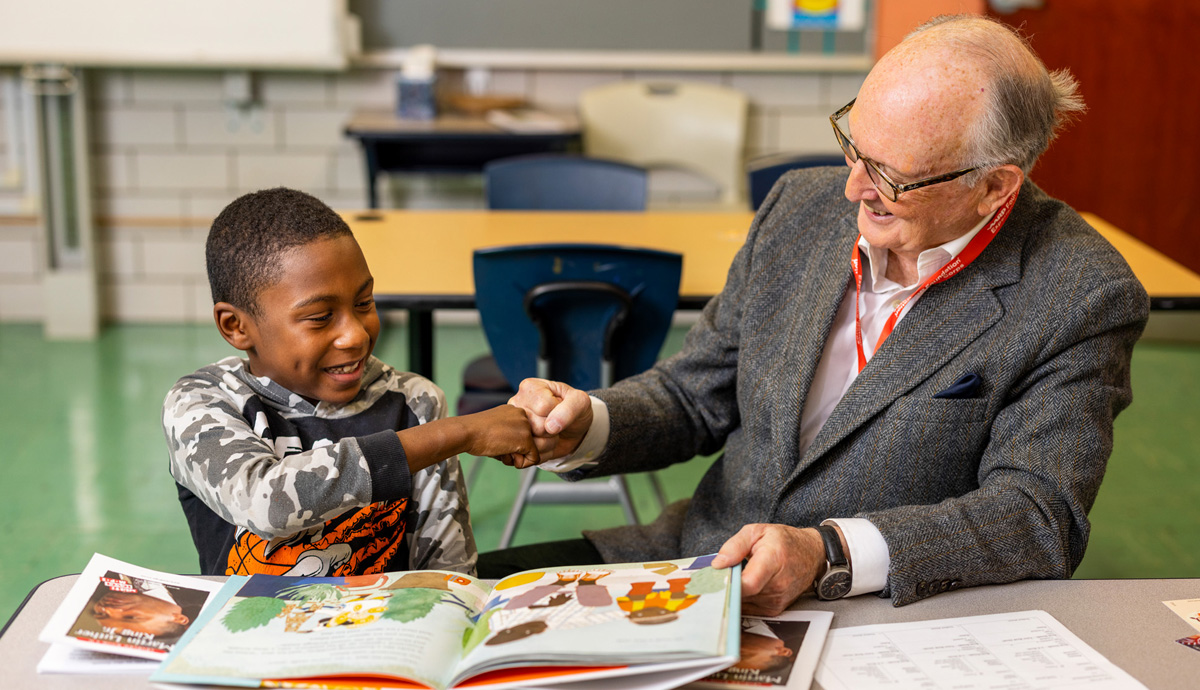Looking To Give Back?
Tutoring is a proven way to make a lasting difference in children’s lives — and yours!

Helping someone learn to read is an amazing feeling. There’s nothing like seeing the lightbulb go on in a child’s eyes when they “get it.”
You know what’s an even better feeling? Knowing this lightbulb moment will continue to power their lifelong success. Research shows that children who learn to read by the end of third grade are far more likely to graduate from high school, attend and complete college, earn higher incomes, and have overall better life outcomes.
Children who can’t read at grade level by fourth grade, however, are four times more likely not to graduate from high school, putting them on a path to poverty later in life.
Thankfully, decades of research also shows tutors can make a big impact in children’s lives — especially now, when so many kids are struggling to catch up following the pandemic. In fact, tutoring is one of the most effective ways to increase achievement for students from low socioeconomic backgrounds.
If you’re thinking, “I’m not a teacher” or “I’ve never tutored anyone before”, don’t worry. AARP Foundation Experience Corps trains people over 50 as tutors to help students become better readers in communities where opportunities have traditionally been lacking.
Below is additional information on how you can make a difference.
Why tutoring is so critical for kids
You’ve probably already know that the early years of children’s lives are so important.
According to the National Research Council, a child’s likelihood of graduating high school can be predicted with reasonable accuracy by knowing their reading level at the end of third grade.
Third grade is an especially important year. Up until then, children are learning to read. But in fourth grade, they need to be able to read to learn.
Once children fall behind, it can be challenging to catch up, especially in a large classroom or if students are afraid of embarrassing themselves in front of the class. But when children are given one-to-one attention and extra help when they need it, they gain the opportunity to thrive.
When you become an Experience Corps Volunteer Tutor, you’ll get the training and support you need to make that a reality for students in communities near you. You’ll also be making a real difference for children at a pivotal time, placing them on the path to long-term economic success.
Experience Corps volunteers have a proven track record of helping children attain literacy proficiency by the end of the third grade.
In fact, more than half of Experience Corps students experienced a significant positive change in social-emotional learning outcomes that may help them avoid being held back a grade.

When you volunteer, you can help us reach more children than ever.
Why tutoring is important for older adults, too.
Volunteering can help you stay active. As we grow older, our risk of experiencing social isolation also grows. Perhaps you’ve retired or moved. Or you’ve gotten out of the habit of reaching out to family and friends.
Losing social connections or a sense of usefulness can lead to feelings of loneliness and isolation — and can affect your physical and emotional well-being.
When you become a Volunteer Tutor, you’ll get the chance to share your life experience with others and give back to younger generations. According to one study, 96% of volunteers reported that the program increased their sense of purpose in life.
Another study showed that for some volunteers participating in Experience Corps actually reduced deficits in areas of the brain associated with the development of dementia.
What you need to know
No experience is necessary to become a Volunteer Tutor, and we’re actively looking for people eager to give back.
Since 1996, Experience Corps has made volunteering easy for older adults. To get started, you’ll simply need to:
- Undergo a criminal background check (because you are working with young children)
- Complete a two-day training with a local organization administering Experience Corps
- Commit to tutoring and tracking student progress once or twice per week during the school year
Take the first step by inquiring about becoming a Volunteer Tutor today.
Even more meaningful is knowing that I’ve created a connection with this future generation. I know kids today are struggling mentally and socially. I’m glad our program is tackling these issues.
Linda Fong, Experience Corps Volunteer Tutor

Become a Volunteer Tutor
Help young children get back on track and become better readers right in your community. In-person and virtual opportunities available.
Inquire Today